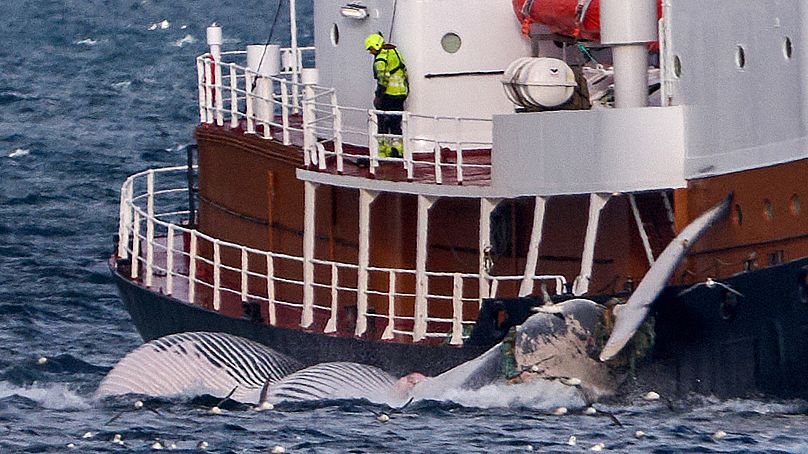Iceland has suspended whaling for three months as support for the controversial practice drops.
Iceland has suspended whaling until the end of August in the name of animal welfare.
 ADVERTISEMENT
ADVERTISEMENT
 ADVERTISEMENT
ADVERTISEMENT
A full ban could eventually be enforced, according to Iceland's Food Minister Svandis Svavarsdottir.
"I have taken the decision to temporarily stop whaling" until 31 August said Svavarsdottir.
"If the government and [hunting] licensees cannot guarantee the welfare requirements [according to Iceland's Animal Welfare Act], this activity has no future."
Hvalur, the country's last active whaling company, previously announced that this season will be its last because of a decline in profits.
Iceland's whaling season runs from mid-June to mid-September, and will likely not resume after August.
How many whales are killed each year in Iceland?
Current quotas allow for the killing of 209 fin whales - the second longest marine mammal after the blue whale - and 217 minke whales every year. But catches have decreased in recent years because of a decline in demand for whale meat.
The majority of the general population now disapproves of the practice.
A recent survey carried out by the Maskina Institute suggests that 51 per cent of the population in Iceland is opposed to whaling, compared to 42 per cent just four years ago.
According to a report by Iceland's Food and Veterinary Authority, the time it takes to kill a whale violates the country's law. Videos recently released by the organisation revealed that a whale hunt in 2022 lasted five hours.
An independent report released last month by the Icelandic Food and Veterinary Authority - commissioned by Minister Svavarsdottir - revealed some whales killed in Icelandic hunts had taken up to two hours to die. 41 per cent of whales suffer immensely before dying for an average of 11.5 minutes, it found.
Animal protection charity Humane Society International (HSI) Europe has hailed the decision to cancel this year's hunts as a "major milestone in compassionate whale conservation".
"Humane Society International is thrilled and relieved at this news," says Ruud Tombrock, HSI Europe’s executive director. "There is no humane way to kill a whale at sea, and so we urge the minister to make this a permanent ban.
Whales already face so many serious threats in the oceans from pollution, climate change, entanglement in fish nets and ship strikes, that ending cruel commercial whaling is the only ethical conclusion."
Whaling is on the decline in Iceland
Whaling has been on the decline in Iceland for the past four years, with Svavarsdóttir suggesting last year that the practice would end by 2024.
Demand for Icelandic whale meat has decreased dramatically since 2019, when Japan - Iceland's primary market - returned to commercial whaling after a three-decade hiatus.
Hunts also became more costly with the extension of a no-fishing coastal zone requiring whalers to go further offshore.
Iceland, Norway and Japan are the only countries that allow whaling, along with the Faroe Islands, an independent territory of Denmark.











